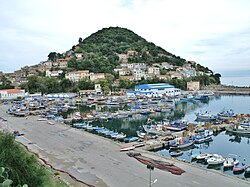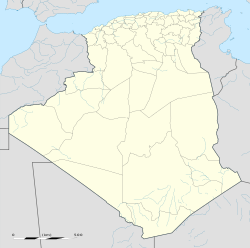Chullu (Roman city)
|
Collo القل |
|
|---|---|
| City and Common | |

Collo
|
|
 Location in Skikda Province |
|
| Location in Algeria | |
| Coordinates: 37°0′20″N 6°33′37″E / 37.00556°N 6.56028°ECoordinates: 37°0′20″N 6°33′37″E / 37.00556°N 6.56028°E | |
| Country |
|
| Province | Skikda |
| District | Collo |
| APC | 2012–2017 |
| Government | |
| • Type | Municipality |
| Area | |
| • Total | 9 sq mi (24 km2) |
| Population (2008) | |
| • Total | 35,682 |
| Time zone | CET (UTC+1) |
| ISO 3166 code | CP |
Collo (Arabic: القل) was an ancient Roman–Berber city in the northern Skikda Province, Algeria. It was the capital and one of three municipalities of Collo District, and a Catholic titular episcopal see under its Roman name Chullu. In 1998, it had a population of 27,800.
In Roman times, Collo was a city in the province of Numidia, called Chullu. At the joint Conference of Carthage (411) that brought together Catholic and Donatist bishops of Roman Africa, Chullu was represented by the Catholic bishop Victor and the Donatist Fidentius. In 484, Quidvultdeus was one of the Catholic bishops that the Arian Vandal king Huneric summoned to Carthage in 484 and then exiled. Bishop Aurelius of 256 is assigned to this diocese by 19th-century Morcelli, but to Cillium (modern Kasserine) by 20th-century Berthier and Mesnage.
In 1282, king Peter III of Aragon led an expedition to Collo, in proclaimed support of a rebellion against the ruler of Tunis. The rebellion had collapsed before Peter arrived, but he kept his army there for several weeks until, in the wake of the Sicilian Vespers, envoys from Sicily came to Collo to offer him its throne. The resulting war continued until 1301.
In 1833, the Roman diocese was nominally revived as a titular see of the lowest (episcopal) rank. So far, it had four incumbents:
...
Wikipedia

